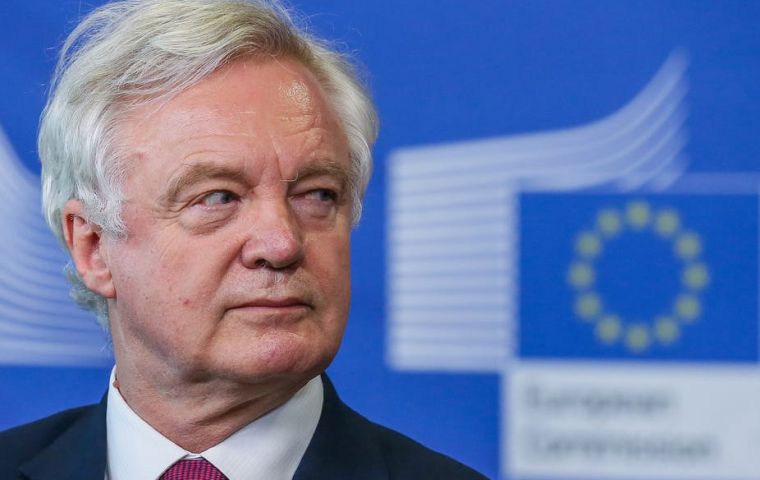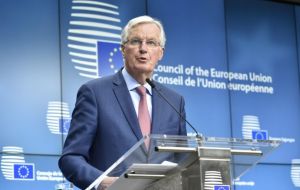MercoPress. South Atlantic News Agency
EU rules for post-March 2019: UK abides but will not be involved in making them
 Brexit Secretary David Davis said the UK wanted a “right to object” to new laws passed by the EU during this time
Brexit Secretary David Davis said the UK wanted a “right to object” to new laws passed by the EU during this time  Speaking at a press conference, chief negotiator Barnier said UK would be allowed to attend decision-making meetings on a “limited, exceptional, case by case basis.”
Speaking at a press conference, chief negotiator Barnier said UK would be allowed to attend decision-making meetings on a “limited, exceptional, case by case basis.”  Mrs. May's Brexit ''inner circle'' of senior ministers met in sub-committee on Monday morning to discuss how the transitional phase could work
Mrs. May's Brexit ''inner circle'' of senior ministers met in sub-committee on Monday morning to discuss how the transitional phase could work The European Union has set out its demands for the temporary transition period after the UK leaves in March 2019, and EU wants the UK to continue to follow its rules but not be involved in making decisions.
Brexit Secretary David Davis said the UK wanted a “right to object” to new laws passed by the EU during this time and Downing Street anticipated there would “naturally” be differences between the sides ahead of negotiations. The UK hopes the two sides can reach agreement by March.
The transition period - also referred to as an implementation period - is seen as a way to minimize disruption when the UK leaves the EU for things like business, holidaymakers and security. It will also allow more time to finalize the terms of the UK's post-Brexit relations with the EU.
In their guidelines, the EU say:
• Transition should run from Brexit in March 2019 to 31 December 2020
• All EU rules and regulations - as well as EU rule changes adopted after March 2019 - should apply in the UK during the transition phase
• There can be no “cherry picking” on the single market - so free movement into the UK should continue
• The UK will not be involved in the decision-making of EU bodies
• It cannot implement its own international agreements unless the EU agrees
• Work should continue on finding a solution to the Northern Ireland border question, one of the main sticking points in the first round of negotiations
Speaking at a press conference after EU ministers agreed the negotiating guidelines, chief negotiator Michel Barnier said the UK would be allowed to attend decision-making meetings on a “limited, exceptional, case by case basis.”
It would be able to negotiate trade deals with other countries but the deals could not come into force until the transition period was over, he added. This is in line with the UK's negotiating stance, as set out by Mr. Davis in a speech on Friday.
Mr. Davis also said existing international agreements - which include trade deals with other countries and agreements on aviation and nuclear power - should continue to apply during the period.
Giving evidence to a House of Lords committee on Monday, Mr. Davis said the UK wanted a “right to object” to new laws passed by the EU during the transition phase over which it had no say and disagreed with.
“It's not particularly democratic practice to just have the country accept without any say-so, anything - particularly if... the European Union takes it on itself to do something which is actively disadvantageous to a major British industry or something like that,” he said. “So that's why we've raised the matter, and let's see how it goes.”
Asked what legal status this would have, he said he wanted such a safeguard included in the withdrawal agreement.
Some in the UK are unhappy at the idea that the UK will have to follow the rules of the single market and the customs union, including freedom of movement for EU citizens, but will lose its voting rights.
Mrs. May's Brexit ''inner circle'' of senior ministers met in sub-committee on Monday morning to discuss how the transitional phase could work, including the UK's demand that it be free to negotiate trade deals with other countries during the period.
Earlier a Downing Street spokesman said: ''There is obviously going to be a negotiation on what the implementation period looks like. ''The formal directives will be released later. This will be a negotiation and there will naturally be some distance in the detail of our starting positions”.




Top Comments
Disclaimer & comment rulesCommenting for this story is now closed.
If you have a Facebook account, become a fan and comment on our Facebook Page!